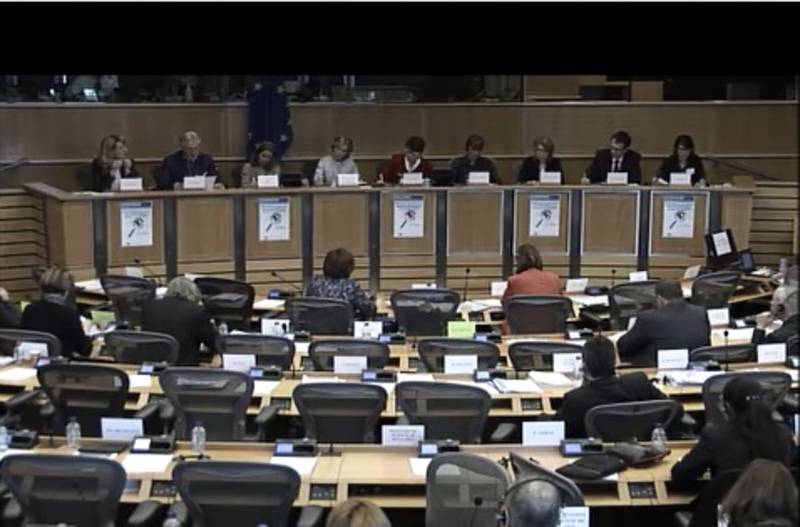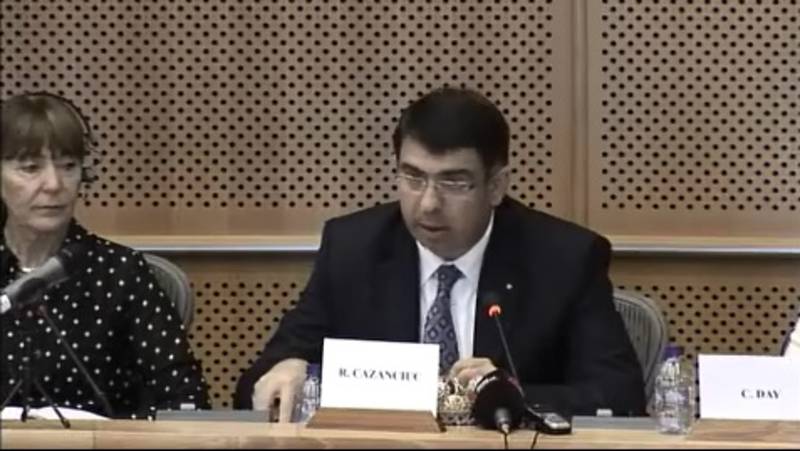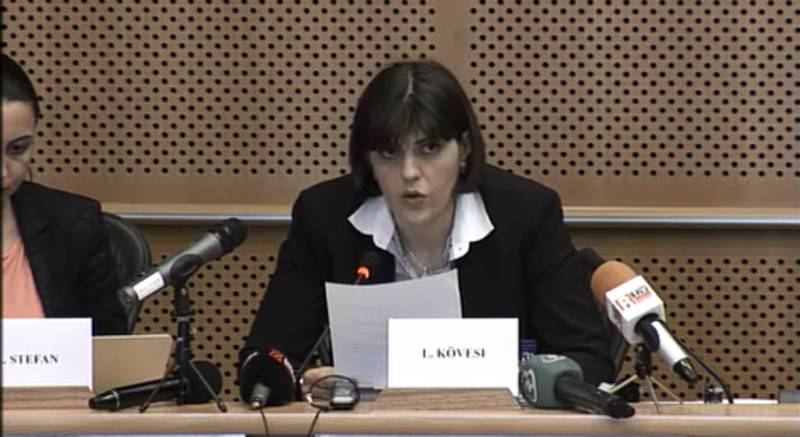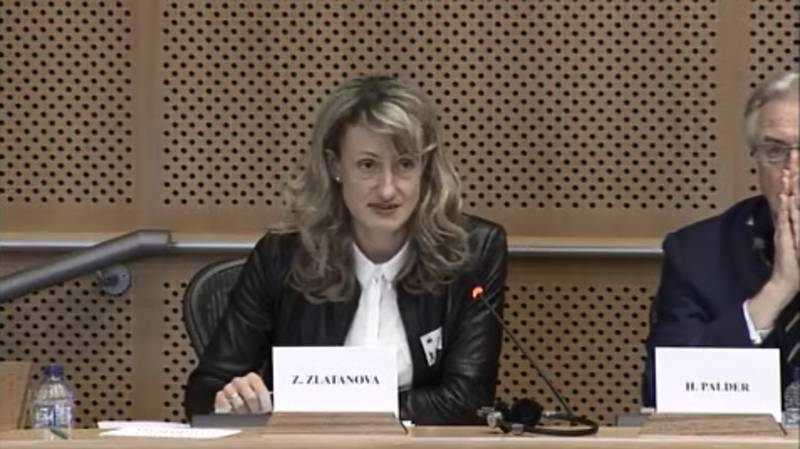CVM Should Stay. Did you hear that, Mr Juncker?
Adelina Marini, April 18, 2015
 Eight years after entering into force the Cooperation and Verification Mechanism (CVM), created specifically for Bulgaria and Romania to allow them to join the EU without having completed the reforms of the judiciary demanded of them and without them having made the fight against corruption and organised crime irreversible, was for the first time discussed broadly and in-depth in the European Parliament. Through the years after it was conceived the results from its functioning were a subject of debates in the plenary mainly after they were bound to the two countries' membership in the Schengen space of security but never have there been debates on the substance of this Mechanism, its purpose and future. And although on 14 April such a discussion did take place for the first time, the format caused discontent because the hearing took place not in the relevant committee for civil liberties, justice and home affairs but in the budget control committee.
Eight years after entering into force the Cooperation and Verification Mechanism (CVM), created specifically for Bulgaria and Romania to allow them to join the EU without having completed the reforms of the judiciary demanded of them and without them having made the fight against corruption and organised crime irreversible, was for the first time discussed broadly and in-depth in the European Parliament. Through the years after it was conceived the results from its functioning were a subject of debates in the plenary mainly after they were bound to the two countries' membership in the Schengen space of security but never have there been debates on the substance of this Mechanism, its purpose and future. And although on 14 April such a discussion did take place for the first time, the format caused discontent because the hearing took place not in the relevant committee for civil liberties, justice and home affairs but in the budget control committee.
The hearing was organised by the budget control committee on its own request on the grounds of its competences as among them are the fight against fraud, protection of the EU financial interests and monitoring the financing and implementation of EU policies. This is the reason why the request of the committee was respected. And it was highly useful. The hearing has revealed something we have suspected for a long time - not only that Romania and Bulgaria are no longer in a package but there is a growing gap between them. Against the backdrop of the progress Romania has scored in the past years and especially in the past two years, Bulgaria is lagging behind, notably. Moreover, Bulgaria has marked regress, as Catherine Day noted, general secretary in the European Commission.
The hearing lasted three hours and a half and started intensively with Romania. The MEPs (from LIBE as well) heard the Romanian Minister of Justice Robert Cazanciuc, the chief prosecutor of the National Anti-Corruption Directorate Laura Codruta Koevesi and representatives of the Romanian civil sector working in this area. All of them spoke with self confidence and presented real results. Specific recommendations were heard on how this success can be maintained and enhanced.
Alas, the hearing on Bulgaria was vastly weaker both in terms of representation and attendance in the hall but most of all in terms of content. Initially, according to the programme of the hearing, the main speaker for Bulgaria was to be Minister of Justice Hristo Ivanov but he was replaced by his deputy Verginia Micheva-Rousseva. The reason is that Minister Ivanov is too busy currently with the preparation of a set of amendments to the Judiciary Act which is to be presented in the coming days. Bulgaria was also represented by the former minister of justice and before that head of the European Commission representation in Sofia Ms Zinaida Zlatanova and representatives of the non-governmental sector. No concrete results were presented but another strategy and another series of intentions in the future tense. Instead of showing some regret the Bulgarian MEPs who joined the discussion, each of whom elected through a party which is part of the problem and is against a solution, attacked the Mechanism, the format of the hearing and insisted on a common European mechanism because, they said, Romania and Bulgaria are not special cases.
14 reports later
The CVM has been introduced with the accession of Bulgaria and Romania to the EU on 1 January 2007. Since then 14 reports have been published by the European Commission. In 2012, the Commission published summary reports of the first five years of the functioning of the CVM as by then both countries were moving or rather not moving at all in a package. The publication of the summary reports, however, coincided with the political crisis in Romania which is why the summary on this country focused entirely on the crisis. The European Commission fixation was so strong that a decision was made to enhance the monitoring of Romania and to publish an extraordinary report several months later. Instead of doing the same for Bulgaria as a precaution because at the time the country's problems were not that visible as in Romania, the European Commission decided that it can give "a break" of a year and a half to the then government (again led by Mr Boyko Borissov).
 The extraordinary Romanian report was extremely tough and detailed. It even criticised the media which leave themselves to be used as a weapon of the government to deal with inconvenient magistrates. This strong pressure on behalf of the Commission and also the different basis the CVM was built upon in Romania have delivered. Now the arrests and sentences of high level officials are a daily thing. In Romania are already joking and across the Danube those who are angry with the lack of progress quote with envy those jokes that the Romanians have an entire government in prison. The foundation of the judiciary reform and the fight against corruption was laid by Monica Macovei who was a minister of justice at the time. At the moment, Ms Macovei is a member of the European Parliament and was a moderator of the hearing in the budget control committee on 14 April.
The extraordinary Romanian report was extremely tough and detailed. It even criticised the media which leave themselves to be used as a weapon of the government to deal with inconvenient magistrates. This strong pressure on behalf of the Commission and also the different basis the CVM was built upon in Romania have delivered. Now the arrests and sentences of high level officials are a daily thing. In Romania are already joking and across the Danube those who are angry with the lack of progress quote with envy those jokes that the Romanians have an entire government in prison. The foundation of the judiciary reform and the fight against corruption was laid by Monica Macovei who was a minister of justice at the time. At the moment, Ms Macovei is a member of the European Parliament and was a moderator of the hearing in the budget control committee on 14 April.
According to her, the CVM is very efficient. "If it did not exist, in Romania would have not existed the National Anti-Corruption Directorate. An institution with huge success, which works brilliantly", she said in the beginning of the hearing. She also recalled something she said some two years ago in an interview with this website that it was unrealistic to expect of post-communist countries to mark significant progress in only a few years. It was no accident, however, that Minister of Justice Robert Cazanciuc said in his introductory remarks that he was proud of the achievements which are, as the young and very motivated-looking chief of the Directorate, Laura Codruta Koevesi, summarised them: 48 high level officials were subject of prosecution. Among them a former prime minister (Adrian Nastase), a deputy prime minister, members of parliament, senators, ministers. In 2014, the number of individuals sentenced for corruption in Romania was 7 times bigger than in 2006 and the number of investigated cases was 3 times bigger, Ms Koevesi reported.
She continued with the impressive statistics - the number of people who report corruption crimes increased by 75% only in one year - from 2013 to 2014. This, she said, means that the public acceptance is growing that this is the right path. Also growing is the trust in the institutions that fight corruption. According to Ms Koevesi, though, it is not enough to punish corrupt people. In order to eradicate corruption its feeding ground must be destroyed which means institutional stability. And another very important thing - the quality of law enforcement depends on enforcers. What immediately draws attention in Romania is that there is obviously a change of generations. At the top levels of the Directorate are all young people.
But not everything is pink-tinted as it seems, Laura Codruta Koevesi admits. There are endless attempts by the political class to either change the anti-corruption law or to remove inconvenient prosecutors. For now these attempts are unsuccessful for one very important reason - the pressure of the civil society and especially the external reaction, especially the Commission. "Without this mechanism the reform of the judiciary would have never had such a scale", the Romanian chief prosecutor of corruption concluded. It was precisely the political class that was targeted by the European Commission in its report under the CVM last year when in the text it was explicitly said that the parliament hampers the fight against corruption. This year, too, the Commission points to the political class as a major impediment.
 What strongly distinguishes Romania from Bulgaria is that in its report on our northern neighbour the Commission sees something that for years stood unchanged - a significant track record has been built as by this it is generally meant sentences. In the same time, however, the report notes that the political attacks on the fundamentals of the reform show that there is no consensus to achieve the goals of the CVM. However, this lack of consensus was nowhere to be seen during the Romanian hearing. Everyone - the non-governmental sector, the governmental one and also the independent Directorate - were unanimous that the reform must continue and this is precisely why the CVM must stay.
What strongly distinguishes Romania from Bulgaria is that in its report on our northern neighbour the Commission sees something that for years stood unchanged - a significant track record has been built as by this it is generally meant sentences. In the same time, however, the report notes that the political attacks on the fundamentals of the reform show that there is no consensus to achieve the goals of the CVM. However, this lack of consensus was nowhere to be seen during the Romanian hearing. Everyone - the non-governmental sector, the governmental one and also the independent Directorate - were unanimous that the reform must continue and this is precisely why the CVM must stay.
The hearing on Bulgaria revealed not only the lack of political consensus but also the lack of understanding what is wrong. Deputy Minister of Justice Ms Rousseva presented briefly the latest strategy for reform of the judiciary voted in the beginning of the year after a tough and difficult debate in parliament. In her words, the strategy was approved with a "constitutional majority" of 173 MPs (out of 240). And although there was strong resistance, still a strategy is what it is - just a strategy. It does not mean specific actions. In this sense was quite odd the statement of Ms Zinaida Zlatanova, who in her short being as a minster of justice in Plamen Oresharski's government which had a little more than a year life under permanent pressure of street protests, used to say that the reform of the judiciary did not depend on her but on the magistrates.
In front of an almost empty hall in the European Parliament in Brussels she said it was wonderful that each strategy for reform of the judiciary is a continuation of the previous one no matter that it is never realised entirely. According to her, a lot has changed in the past two decades in the country. In the 2000s, she said, it was possible a deputy chairman of a ruling parliamentary group to become a chairman of a court and later an ombudsman. Ms Zlatanova probably has in mind Mr Konstantin Penchev who was a member of the NDSV party (the party of the former Bulgarian tsar Simeon) and from a member of parliament he became a president of the Supreme Administrative Court and later was appointed ombudsman of Bulgaria. In Ms Zinaida Zlatanova's words, despite this transition from a political function to an independent judiciary position he is a very respected person.
Now, she said, this is impossible. Probably this transition precisely is not possible but, instead, it has become possible the government, of which Ms Zlatanova was part, to propose a very controversial and surrounded by nontransparency figure of Delyan Peevski to head the most powerful security agency in the country - the State Agency for National Security (DANS). Delyan Peevski is a young (35 years old) member of Parliament from the Movement for Rights and Freedoms (the Turkish ethnic minority party), member of the ALDE party. He is known for his wealth for which there is no reasonable explanation. There is also no explanation how has he become so successful in his political career. He is known for being the owner of a media empire. His appointment as head of DANS was the drop that forced the civil society out in the streets. Thousands of people from all over the country protested for days until his nomination was finally withdrawn. Later, the protests, although having shrunk in volume, continued for months demanding the model WHO (who is behind Peevski and dictates the government whom to appoint) to be abolished. (The model WHO has turned into an euphemism for the oligarchy that is ruling the country. It is a very popular hash tag in the social media).
According to Zinaida Zlatanova, there is no political consensus in Bulgaria about the reform of the judiciary. Moreover, she underscored, such a consensus is lacking even within the ruling coalition. She quoted the example of the surprising amendments to the Judiciary Act, filed in parliament by Tsvetan Tsvetanov, a vice president of the senior coalition party GERB (EPP), a former deputy prime minister and ex-minister of interior, sentenced recently to 4 years in prison for a crime against justice. This is the first sentence against such a high level official in Bulgaria. He, together with other MPs, filed the amendments in parliament despite the fact that the Ministry of Justice is expected to present a draft of amendments which are in line with the recently adopted reform strategy. Zinaida Zlatanova recalled that  these amendments differ significantly from those being prepared by the justice minister which are due to be published in the coming days.
these amendments differ significantly from those being prepared by the justice minister which are due to be published in the coming days.
The former head of the Commission representation in Sofia also underscored that it is absolutely inadmissible the fight against corruption, which Bulgaria lacks a track record for the high level corruption, to be measured in numbers of sentences. "The outcome of the fight against corruption is not a number of convicted politicians but a reduction of corruption. Freeing the economy of corruption", she said. Monica Macovei told her, however, that there is always a need of concrete results. There need to be effective sentences because this proves that the efforts were not only on political level. This also means that the illegally acquired assets will be returned.
The latter was a subject of strong criticism against both countries. James Hamilton, an independent legal consultant from Ireland, criticised the Romanians for their system for confiscation of crime assets as not working well. Only 8% of the court rulings for confiscation have been implemented which means that the procedure needs to be simplified, he said. In 2012, there was a reform of the system for confiscation of crime assets in Bulgaria but it never worked because there was no support for it, said Helmut Palder, counsellor in the Bavarian Ministry of Justice who is closely following the reform in Bulgaria. He underscored that the Bulgarian society is, in fact, very patient. In the end of the hearing Monica Macovei concluded with a call on the Bulgarian and Romanian governments to finally introduce in their national legislation the directive on confiscation and recovery of crime assets.
Among those who spoke on behalf of Bulgaria, however, there was no consensus whether the CVM should stay. Dr Linka Toneva-Metodieva, an expert with Transparency International, said that the Mechanism is flawed. What the CVM and the Commission should do is to abolish the language of political correctness and diplomacy because it does not allow to see the problem in its essence. In addition, the analyses should be addressed not to the political class who interpret them to their liking but to the Bulgarian citizens. Georgi Pirinski, a Bulgarian MEP, member of the Bulgarian Socialist Party which inherited without condemnation the former Communist Party and ex-minister of foreign affairs in the early years of the Bulgarian transition, said that the CVM has to be abolished. Romania and Bulgaria should not be viewed as special cases because, according to Eurobarometer polls, 76% of all Europeans are of the opinion that corruption is widespread in their countries.
The percentage is 84 for Bulgaria and 93% for Romania, he said. Andrey Novakov, MEP (EPP), reminded that Bulgaria is among the countries with the lowest level of errors in the EU funds absorption. However, errors do not mean corruption but just errors. He also pointed to another argument against the CVM and the singling of Bulgaria and Romania out which is that Bulgaria is among the countries with the highest absorption level of EU funds, which, he said, means trust in the auditing bodies. Iliana Yotova from the Socialists and Democrats group said that the CVM should be abolished because for a long time there has been no interest in it. In Bulgaria no one is reading the reports anymore, she said to which Monica Macovei retorted that the CVM is designed for those who want reforms. Reports are read  by everyone who are interested. "If we, as politicians, defend the thesis that the reports are not read, this is a bad message for the citizens", she said.
by everyone who are interested. "If we, as politicians, defend the thesis that the reports are not read, this is a bad message for the citizens", she said.
During the discussion the issue of the link between the results from the CVM and the accession in Schengen was also touched upon. This is an issue which there were also disagreements on. During the Romanian hearing the understanding why some countries make such a connection prevailed. A Romanian MEP proposed, however, Romania to be accepted in Schengen because of its good results in the fight against corruption. From Bulgarian side were heard strong criticisms against making such a connection and were presented arguments that Bulgaria is not the only country with corruption. Indeed it is not but what is important is not whether there is corruption but what efforts are invested to fight it.
Despite the hopes of the budget control committee chairwoman Ingeborg Graessle (EPP, Germany) during the hearing an agreement to be reached in what direction the CVM to continue, there was no such agreement. During the Romanian hearing there was unanimity that the CVM is useful and should stay whereas in the Bulgarian hearing there was no such unanimity. Nevertheless, this is an important message for European Commission President Jean-Claude Juncker who repeatedly promised to the Bulgarian government and President Plevneliev the Mechanism to be abolished by the end of the mandate of the Commission. This is a wrong message against the backdrop of the already null efforts of Bulgaria to tackle its deeply rooted problems which Dr Toneva-Metodieva described as follows: there is no progress in the situation in Bulgaria in the past 8 years. The shadow economy is stable at 30%. There is no economic freedom but economic dependence. Bulgaria is one of the most corrupt EU member states. In the past years we are witnessing a multi-direction and unequivocal story, was the opinion of the expert from Transparency International.
In support of the need the CVM to stay until it completes its mission is the fact that the Commission strong pressure two years ago on Romania proved to be a strong boost for reforms. So far there has never been such a pressure on Bulgaria despite the deteriorating conclusions in the reports. Obviously, it is time instead of weakening the pressure to strengthen it.
*In a previous version of this text it was wrongly stated that Konstantin Penchev was the first Bulgarian ombudsman. He was second
 Entrance to the Berlaymont building | © EC - Audiovisual Service
Entrance to the Berlaymont building | © EC - Audiovisual Service | © European Union 2020, EC - Audiovisual Service
| © European Union 2020, EC - Audiovisual Service Commission President Ursula von der Leyen | © European Union 2019 - Source: EP
Commission President Ursula von der Leyen | © European Union 2019 - Source: EP